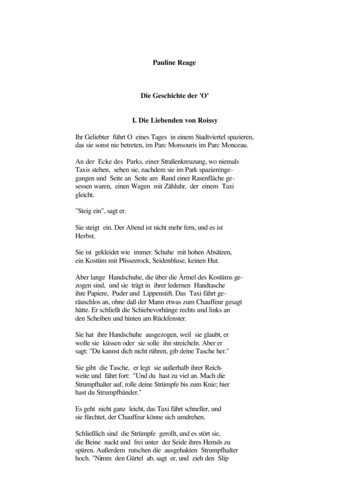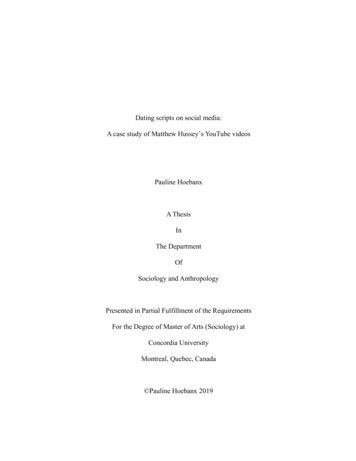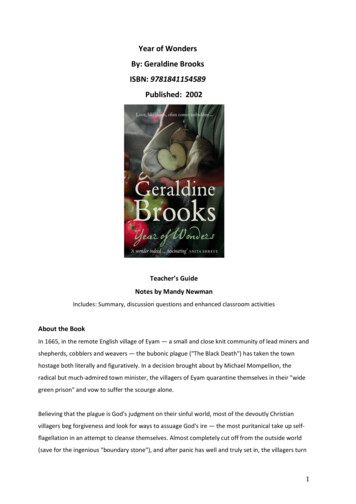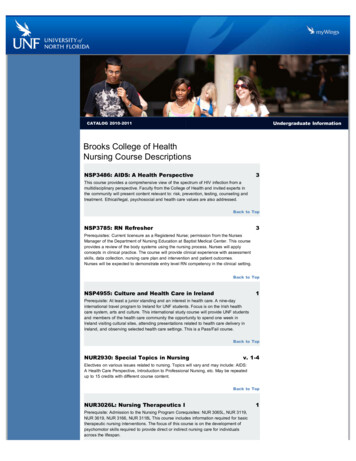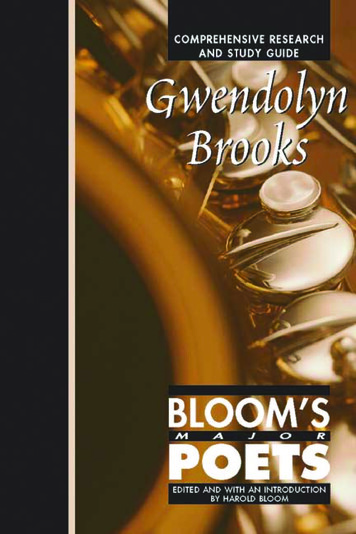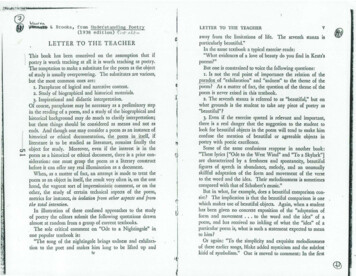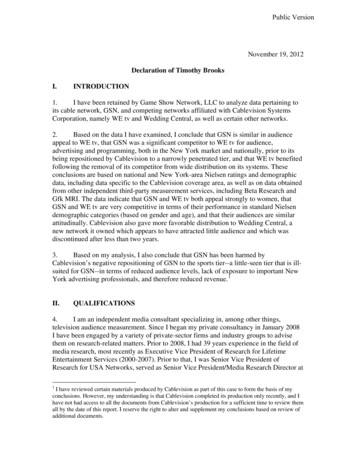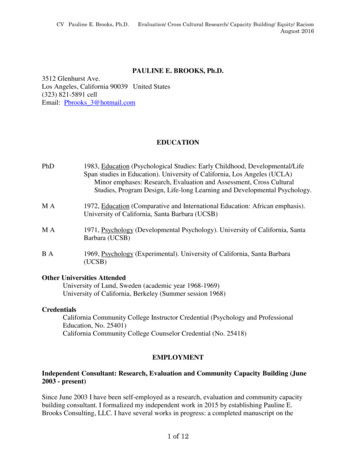
Transcription
CV Pauline E. Brooks, Ph.D.Evaluation/ Cross Cultural Research/ Capacity Building/ Equity/ RacismAugust 2016PAULINE E. BROOKS, Ph.D.3512 Glenhurst Ave.Los Angeles, California 90039 United States(323) 821-5891 cellEmail: Pbrooks 3@hotmail.comEDUCATIONPhD1983, Education (Psychological Studies: Early Childhood, Developmental/LifeSpan studies in Education). University of California, Los Angeles (UCLA)Minor emphases: Research, Evaluation and Assessment, Cross CulturalStudies, Program Design, Life-long Learning and Developmental Psychology.MA1972, Education (Comparative and International Education: African emphasis).University of California, Santa Barbara (UCSB)MA1971, Psychology (Developmental Psychology). University of California, SantaBarbara (UCSB)BA1969, Psychology (Experimental). University of California, Santa Barbara(UCSB)Other Universities AttendedUniversity of Lund, Sweden (academic year 1968-1969)University of California, Berkeley (Summer session 1968)CredentialsCalifornia Community College Instructor Credential (Psychology and ProfessionalEducation, No. 25401)California Community College Counselor Credential (No. 25418)EMPLOYMENTIndependent Consultant: Research, Evaluation and Community Capacity Building (June2003 - present)Since June 2003 I have been self-employed as a research, evaluation and community capacitybuilding consultant. I formalized my independent work in 2015 by establishing Pauline E.Brooks Consulting, LLC. I have several works in progress: a completed manuscript on the1 of 12
CV Pauline E. Brooks, Ph.D.Evaluation/ Cross Cultural Research/ Capacity Building/ Equity/ RacismAugust 2016physical, mental, and emotional health benefits of tai chi; working on two books (one academicand one trade) on defining, framing and measuring inequities in everyday society; and amworking on an article (my abstract has been accepted) for Social Sciences and Medicine, onstrengthening methods for research and program evaluation concerning racism and health.My independent consulting encompasses all phases of research, evaluation and communitycapacity building: e.g. program and evaluation planning in economically/racially/culturallydiverse communities, developing and pilot-testing instruments, collecting quantitative andqualitative data, data cleaning, analyses, write-up, follow-up and working with programparticipants and clients. During this period of consulting I have worked with the followingclients: Echo Parenting and Education, Los Angeles: school-wide trauma informed initiativeAfrican Communities Public Health Coalition: Ethiopian, Sierra Leone, Liberian andGuinean ProjectsUniversity of North Carolina (UNC), Maternal and Child Health: initially as anevaluation consultant for their Kellogg First Food evaluation, then most recently asAdjunct Assistant Professor in the Gillings School of Global Public Health.California Consumer Protection Foundation, with an evaluation focus on: 1)characteristics of good grantmaking and the effective use of cy pres monies; and 2)evaluating the Foundation’s Community Collaborative Fund (a 25 million grantmakingprogram) including lessons learned by both the Foundation and its grantees.Flo Stevens & Associates, doing evaluation work on: 1) a four-year Los Angeles UnifiedSchool District (LAUSD) project monitoring the implementation of district-wide policyon cultural competence/cultural responsiveness in education; 2) evaluation of a multi-yearLAUSD-UCLA Teaching American History project; 3) evaluating Delphi Schools.Black Women for Wellness: providing a variety of technical assistance and professionaldevelopment trainings for several reproductive Health Education projects.San Francisco State University: State and district policy research on obesity in schoolchildren.California Women’s Law Center (3 projects): 1.) Domestic Violence; 2.) Teen DatingViolence (school district policy); and 3.) Reproductive Health Rights (educationaloutreach for 3 non-English speaking, hard to reach, communities of women).The Rosalinde and Arthur Gilbert Foundation: program planning and designingevaluation instruments.The Atlas Family Foundation: designing and conducting an evaluation of 10 years ofgrantmaking and helping the foundation plan for future directions.The California Endowment (The Endowment)Manager of Evaluation and Manager of Evaluation Technical Assistance (June 1999 – May2003). I hired, trained and managed a professional evaluation research staff for this large healthfoundation. During my tenure, The Endowment granted well over 120 million annually. Myresponsibilities included: supervising research and evaluation technical assistance and trainings for TheEndowment’s staff2 of 12
CV Pauline E. Brooks, Ph.D.Evaluation/ Cross Cultural Research/ Capacity Building/ Equity/ RacismAugust 2016 planning and designing the foundation’s evaluation Requests For Proposals(RFPs)/Requests For Quotes (RFQs)managing/supervising a portfolio of multi-million dollar evaluation research contracts forlarge strategic program grants and initiativesmaking presentations to the Board of Directorssupervising the review, hiring and management of evaluation and research consultantsdeveloping assessment instruments, selecting appropriate methodologies and the writingof reportsmanaging the provision of technical assistance to a wide variety of community-based,culturally diverse health granteesparticipating as a regular member on cross-department, strategic and institutionalplanning teamsparticipating in the review of hundreds of grant applicationsconducting research and evaluation/assessment trainings at professional philanthropicassociations (e.g. at the Council on Foundations, the Southern California Association ofPhilanthropy and other associations)routinely organizing and presenting grant-related papers, including inter-institutional andcollaborative trainings at professional associations: e.g., at the American EvaluationAssociation, the American Public Health Association and Council on Foundationsserving as the institution’s representative at selected local and national convenings, forexample, as an active member of the CDC’s REACH 2010 Blue Ribbon Panel onEvaluating Racial Disparities in Health. I co-chaired that panel’s subcommittee on racismand have continued professional contacts with many of the panel’s members.developing material for the institution’s websitePacific Institute for Women’s Health (PIWH), Los Angeles.International Evaluation Consultant (June 1998 – 2002). I served as a research and evaluationconsultant for three international projects (funded by Rockefeller and Mellon foundations). Twoof the projects involved health and required that I make trips to Africa (Kenya and Burkina Faso).Children’s Hospital, Los Angeles: Department of Adolescent Medicine.Director of Evaluation/temporary acting position (Variable percent time, June 1998 - June1999). I served in the capacity of a temporary Evaluation PI and consultant as the departmentwent through transitions. My evaluation work involved several predominantly monolingualSpanish speaking community-based projects.Science Learning, Inc. (SLi), Annapolis, Maryland.Coordinator of Evaluation (50% time, June 1997 – August 1998). I served as Coordinator ofEvaluation for SLi’s short-term contract with the California Science Center, Los Angeles. Ideveloped quantitative and qualitative data collection instruments, designed evaluation plans forfour Science Center projects, carried out collaborative evaluation activities, and supervised aresearch project that involved a telephone survey of 1,000 randomly selected Los Angelesresidents. My regular duties included quarterly report writing and final write-ups of the3 of 12
CV Pauline E. Brooks, Ph.D.Evaluation/ Cross Cultural Research/ Capacity Building/ Equity/ RacismAugust 2016evaluation studies and research. I presented a paper on this research at the 1998 AmericanAssociation of Museums Conference, Los Angeles.Claremont Graduate University, Claremont, California.Adjunct Professor. (One-year Academic position, 1997–1998/Replacement for facultymember on leave). Courses taught were PSY 350: Grant Writing; PSY 315m: Cross CulturalResearch Methods and Issues; and ED 408: African American Communities, Families, andEducation. I supervised the research of several graduate students, provided technical advice forseveral large evaluation projects, and served on a doctoral exam committee.Pomona College, Psychology DepartmentLecturer. (Part time replacement for faculty member on leave; 1996-97). I taught one courseper semester: PSY 177/IDBS 177: African American Families in Communities (Fall, 1996); and,PSY 112CC/IDBS 112CC: Interethnic Relations from the Impersonal to the Personal (Spring,1997).Drew University of Science and Medicine, Healthy African American Families (HAAF),Phase II.Director of Evaluation. (75% time, October 1, 1995 - May 1997).I hired, trained and supervised three evaluation staff in conducting a qualitative evaluation of acommunity-driven ethnographic research project (funded by the CDC) addressing Black infantlow birth weight. I designed the initial evaluation plan and directed the evaluation of this projectfor over four years, since the time of the project’s beginnings at UCLA’s School of Public Health(1992- 1995) (see below).University of California, Los Angeles (UCLA), Center for the Study of Evaluation (CSE).Project Director for Evaluation. (Both part-time and full-time, June 1989 - September1995).I directed the evaluations for:1) a three-year qualitative evaluation of an African American community – universitycollaborative ethnographic research study (HAAF), funded by the CDC, and conducted by theUCLA School of Public Health on pregnancy and low birth weight; 2) several separateevaluations, including one longitudinal assessment of an after-school education and enrichmentprogram operating in 19 culturally diverse urban public schools; 3) a national program (Padres ala Escuela) conducted by the National Committee for Citizens in Education, Washington D.C.My involvement at UCLA’s CSE included all aspects of evaluation work. I hired andsupervised staff in the conduct of research in many languages--Spanish, Korean, Tagalog,Vietnamese, and Cantonese--and culturally modified the content and application of instrumentsin order to net the highest quality of data from the many different cultural communities.Graduate School of Education, UCLA4 of 12
CV Pauline E. Brooks, Ph.D.Evaluation/ Cross Cultural Research/ Capacity Building/ Equity/ RacismAugust 2016Lecturer. Taught graduate course on learning theories and applications of those theories toeducational settings (ED212A; Assistant Professor IV rank; Fall 1991, 1990).California State University, Los Angeles (CSULA)Assistant Professor. (Part time, Fall 1986-1991). Courses taught:SW 301:SW 455:FS101:PSY 433:PSY 412B:EDSP 412:EDSP 410:EDSP 400:Social Work WritingFamily ViolenceMarriage and FamilyPsychology of Cognitive DevelopmentAdolescence and Young AdulthoodChild Abuse and NeglectMainstreaming in Special Education (for non-majors)Introduction and Overview to Special Education (for graduate majors)Charles R. Drew Postgraduate Medical School, Los Angeles. Child Abuse PreventionNetworkChild Therapist (80% time, 1984-1985). Responsibilities: conducted psychological andeducational assessments, therapeutic interventions, and parent education for culturally diversefamilies of abused preschoolers; planned evaluation and research studies; networked with othermental health professionals and maintained records.University of California, Los Angeles (UCLA)Postdoctoral Training: Visiting Scholar and Postdoctoral Scholar, Center for the Study ofEvaluation (1983-1985)Neuropsychiatric Institute, UCLAStaff Research Associate (50% time, 1983-1984). Responsibilities: worked on theoreticalconceptualizations and hypotheses testing, statistical planning, analyses, and write-ups forresearch on the sexual socialization of American women.Center for the Study of Evaluation, University of California, Los Angeles (UCLA)Research Associate/Assistant (50% time, variable, 1979-1981 while working on mydoctorate degree). Responsibilities: worked on teams to conduct quantitative and qualitativeevaluations.Teacher Education Laboratory, University of California, Los Angeles (UCLA)Teaching Associate (Fall 1980, Spring 1981). Responsibilities: taught graduate course on CrossCultural Issues in Education and conducted pilot research on qualities of good supervisingteachers.5 of 12
CV Pauline E. Brooks, Ph.D.Evaluation/ Cross Cultural Research/ Capacity Building/ Equity/ RacismAugust 2016California State University, Dominguez Hills (CSUDH), Psychology DepartmentAssistant Professor (Tenure track, 1974, 1975-1976 (after returning from Africa)).Responsibilities: participated on committees, advised students, and taught the following courses:Child DevelopmentAdolescenceFoundations of Psychology,Psychology of the Black ChildPsychology of the Black ExperienceOccidental College, Los AngelesLecturer. (Fall 1973 and Fall 1974) Courses taught included: Psychology of the BlackExperience and Psychology of the Black Child Through Literature.CONSULTANCIESConsultancies:UNC-Maternal and Child Health contract with State of Michigan’s Departments of HealthUNC-Maternal and Child Health grant with W. K. Kellogg Foundation (June 2012-present)Dwight Stuart Youth Foundation (April-June, 2002)CDC and the American Cancer Society (2002 joint evaluation training institute, Atlanta)California Primary Care Association (March 1998–August 1998)Center for Child Protection and Family Support (Washington, D. C., 1993 - 1997)Participant:I was an invited participant at the World Health Organization’s (WHO) Social Determinants inHealth world conference, Rio de Janeiro, Brazil, October 19-29, 2011. I have also served as anactive member of the Racism and Health Workgroup (RAHW) (led by Dr. Camara Jones at theCDC, Atlanta) and served as co-chair of RAHW’s Global Matters sub-committee (with Dr.Yanique Redwood).Reviewer:California State Department of Education (Sacramento (November 1993; December 1992)Administration for Children, Youth, and Families: Child Abuse and Neglect (Washington D. C.,February 1987)PROFESSIONAL PRESENTATIONS2015 “Un-silencing (In)Equity: The Case of Societal Racial (In)Equities,” peerreviewed paper accepted for Equal Is Not Enough Conference, University ofAntwerp, Belgium, for February 4-6, 2015 (personal reasons kept me fromattending)6 of 12
CV Pauline E. Brooks, Ph.D.Evaluation/ Cross Cultural Research/ Capacity Building/ Equity/ RacismAugust 20162013 “Societal Inequalities Influence Evaluations,” peer-reviewed paper presented at theAmerican Evaluation Association (AEA) annual conference, Washington, DC, October15-20, 2013.2013 “Brooks 5-Paths Strategy Methodology,” peer-reviewed paper presented at the AmericanEvaluation Association (AEA) annual conference, Washington, DC, October 15-20,2013.2012 “Larger Societal Inequalities Intersect Our Evaluations,” peer-reviewed paper presented atthe American Evaluation Association (AEA) annual conference, Minneapolis, MN,October 23-28, 2012.2011 “Is Your Evaluation Tired? Rejuvenate It!” Skills workshop on tai chi and health, copresented at the American Evaluation Association (AEA) annual conference, Anaheim,CA, November 3-6, 2011.2011 Invited participant at the World Health Organization (WHO) Conference on SocialDeterminants of Health, Rio de Janeiro, October 19-21, 20112010 “Old and New Manifestations of Racism and Extrapolations,” peer-reviewed paperpresented at the International Sociological Association (ISA), Gothenburg, Sweden,August, 2010.2010 “Unacknowledged Hidden Obstacles: Racism,” roundtable presentation at theInternational Sociological Association (ISA), Gothenburg, Sweden, August 2010.2010 Developed and conducted a full-day Racism Workshop for the American EvaluationAssociations’ annual convening, San Antonio, TX, November 20102010 Substance Abuse and Mental Health Services Administration (SAMHSA), Washington,DC, 2010, invited presenter on Black History, Race and Health in the United States.2009 Developed and conducted a full-day workshop on Measuring Racism/Racial Inequitiesfor the Evaluator’s Institute, Claremont, California, August 25, 2009.2009 American Evaluation Associations’ annual convening, Orlando, FL, 2009 (two papers)2008 Developed and conducted a full-day Racism Workshop for the American EvaluationAssociations’ annual convening, Denver, CO, November 20082008 “Measuring Racism: For Evaluators,” panel and paper presentation at the AmericanEvaluation Associations’ annual convening, Denver, CO, November 20082008 “Measuring Racism: the Brooks Equity Typology (BET),” paper presented at InternationalSociological Association Conference, Naples, Italy, September 20087 of 12
CV Pauline E. Brooks, Ph.D.Evaluation/ Cross Cultural Research/ Capacity Building/ Equity/ RacismAugust 20162008 “Criteria and Strategies for Measuring Racism and Other Inequalities,” an invited paperpresentation and discussion at the African American Social Policy Forum, Negril,Jamaica, May 20082007 Conducted Half-day Racism Workshop for the American Evaluation Associations’ annualconvening, Baltimore, MD, November 20072007 “To know one’s filters as an evaluator/researcher: Racism,” paper presentation at theAmerican Evaluation Associations’ annual convening, Baltimore, MD, November 20072006 Invited presenter on evaluation at National Academies of Sciences’ Ford Fellowsprogram on developing leaders among underrepresented students at the Predoctoral-,Dissertation- and Postdoctoral levels; Irvine, CA2006 “Monitoring LAUSD’s cultural competency/cultural responsiveness effort,” AmericanEvaluation Association annual conference, Portland, OR, November 20062006 “Ethics, Research and Racism,” paper presented at International Sociological Association(ISA) Conference, Durban, South Africa, July-August 20062005 “Measuring racism—using the Brooks Inequities Typology.” Paper presented at CanadianEvaluation Society/American Evaluation Association convening, Toronto, Canada,October 20052005 “Types of racism and cross-cultural/racial evaluations,” paper presented at CanadianEvaluation Society/American Evaluation Association convening, Toronto, Canada,October 20052005 “Issues of participant protection and data security under post-9/11 legislation,” Discussantpresentation at Canadian Evaluation Society/American Evaluation Associationconvening, Toronto, Canada, October 20052004 “Racism as a variable in racial disparities,” paper presented at African EvaluationAssociation conference, Cape Town, South Africa, December 20042004 “Uncovering racism,” paper presented at African Evaluation Association conference,Cape Town, South Africa, December 20042004 “Measuring racism,” invited workshop presented at the Intercultural Cancer Conference(ICC), Washington, D. C., March 20042003 “Racism as a variable in racial disparities,” paper presented at American EvaluationAssociation annual convening, Reno, NV, November 20032003“Hearing community voices,” paper presented at American Evaluation Associationannual convening, Reno, NV, November 20038 of 12
CV Pauline E. Brooks, Ph.D.Evaluation/ Cross Cultural Research/ Capacity Building/ Equity/ RacismAugust 20162002 “Becoming a learning organization,” a round table presentation on learning withinfoundations, presented at American Evaluation Association annual convening,Washington, D. C., November 20022002“Applying the AEA Ethics Standards in Evaluation,” an evaluation workshop presentedfor the Centers for Disease Control and Prevention and American Cancer SocietyEvaluation Training, Atlanta, GA, 20022002 “New models for evaluation,” an invited paper presentation for the Health EvaluationTopical Interest Group’s Business Meeting, American Evaluation Association annualconvening, Washington, D. C., November 20022001 "Assessing the
Credentials California Community College Instructor Credential (Psychology and Professional . University of California, Los Angeles (UCLA), Center for the Study of Evaluation (CSE). . Teacher Education Laboratory, University of California, Los Angeles (UCLA) Teaching Associate (Fall 1980, Spring 1981). Responsibilities: taught graduate .
